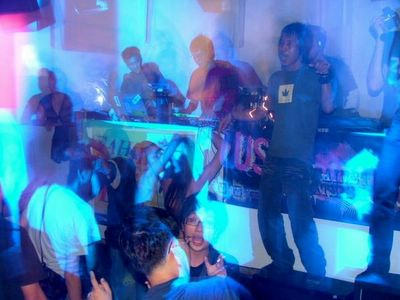Getting my Tart Popped

Last night, I finally attended my first PopTart. For those not in the know, PopTart is a local indie disco event that's been doing the rounds since late last year. What exactly "indie" is, however, is anyone's guess, since the term has been abused beyond recognition by lay persons and music journos alike. In its earliest forms it referred to music released by independent record labels, then later grew to encompass a particular musical ethic and aesthetic, and now is so large that it includes things that are mainstream but just not that mainstream.

But enough about semantics. The night, though marred by what I felt was a rather shitty sound system, was saved by the sheer power of its playlists. I never thought it'd feel so good to listen to the likes of Suede, Blur, Manic Street Preachers, Oasis, Pulp and The Verve again. There's something very different and much nicer about hearing the strains of a much-loved song coming on unexpectedly, as opposed to putting it on yourself. There's also something very exciting about listening to such music at ear-bleeding volumes (even if the sound system sucks): Joy Division's "She's Lost Control" never sounded as good or as menacing. As a friend put it, "after coming to Poptart, listening to music at home not shiok already".
I was also thrilled by The Bravery, who are becoming one of my guilty listening pleasures, and got some practice for the Fischerspooner gig I'll be attending in NYC when "The 15th" was played.
The surprise of the night for me was how Morrissey's "First of the Gang to Die" has become a definitive PopTart anthem, and how his now-defunct band The Smiths have retained a similarly iconic status with a new generation. Many of those present, who were in their 20s, probably didn't grow up listening to The Smiths but reacted to classics like "Ask" and "Panic" as if they did. What elevates a band this far is beyond my comprehension--The Smiths are good and strikingly original, though I can't help wondering if their current popularity is due in part to indie types feeling that they HAVE to love them. In any case, I feel happy for Morrissey: as a chronic malcontent who wanted very much to be famous, and as a lyricist who advanced his cause through melancholia and miserabilia, he would feel extremely vindicated to know how much he is still loved.

0 Comments:
Post a Comment
<< Home